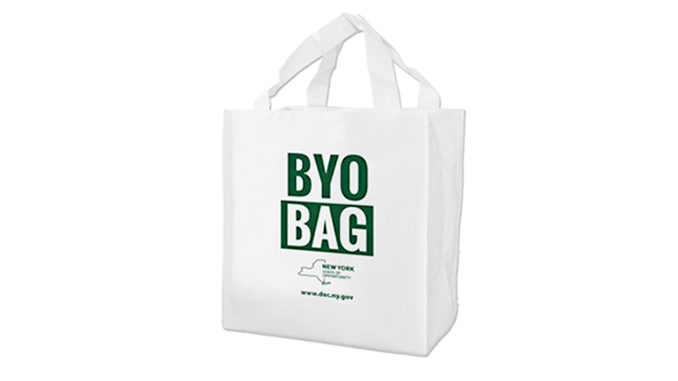
State ban on disposables starts March 1
Grocery shopping in New York will change as of Sunday, March 1. Effective that date, a state-wide ban on single use plastic bags goes into effect.
Grocery and retail stores, pharmacies, gas stations and other locations where consumers make purchases will no longer be able to give you a plastic bag to carry the items you bought home in. Customers are going to need to either bring their own reusable bags, carry their items in their arms, or, in some cases, use paper bags that a store can either choose to give them, or sell them for up to 5 cents each. Most stores also offer the reusable bags for sale for $1, and sometimes give them away.
There are some exceptions — pharmacies can put your medicines in a plastic bag, and restaurants can give you plastic bags to carry your food in, and newspapers can still be placed in plastic bags to keep them dry during the home delivery process. In grocery stores, those clear plastic bags you get in the produce, bakery or meat sections will also remain in use.
It may end up being a shock to many consumers the first few times they shop, but, state officials, and those deeply concerned about the effect of plastic bags on the environment are anxious for the law to take effect.
“Twenty-three billion of those plastic bags are used in New York State every year,” Town of Highlands Environmental Advisory Committee chair Olga Anderson said at last week’s Chamber of Commerce meeting. “After their initial use, those bags clog landfills, pollute waterways, trap animals …. and they take about 1000 years to degrade completely, releasing toxic chemicals as they do.”
Anderson was at the meeting to update those there about the start of the new law with a powerpoint presentation. She said she is willing to make the same report to any local group which would like her to.
She explained that the ban basically affects any retailer which collects New York State sales tax.
A question came up about Farmers Markets; Anderson said she believes the ban is in effect there too.
She is a proponent of the reusable bags, and showed off several of her own, including the ones that can typically be purchased at check-out counters.
“It’s been shown that you can use the reusable shopping bags about 125 times, they’re washable, they carry about 22 pounds, and they’re easier to carry with nylon straps,” she said. “There are also people who make bags; and there are groups which sell bags as fundraisers.”
It was also noted that often the reusable bags are given away as promotions.
“Who doesn’t have a closet or trunk filled with these bags,” she asked. “I think we all do. Use them!”
Because people tend to ‘collect’ them, she said, she’s thinking of trying to start a ‘take a bag, leave a bag’ campaign in the Town of Highlands. She said unwanted reusable bags could be placed in bins in a few locations, for people to grab if they need one. People who find themselves with too many bags could then donate them for others to use.
Discussion after her presentation ranged from people forgetting to bring reusable bags with them when shopping, or those who “go into a store for one item and leave with $100 worth of stuff” … in both cases, Anderson said, it will become habit to carry reusable bags.
Anderson and others noted that Americans — the world’s number one consumers of disposable goods — also need to work on buying less in the first place.
“That will be the theme of our committee’s Earth Day celebration this year,” she said, “reducing waste, in particular food waste.”



